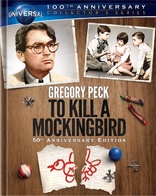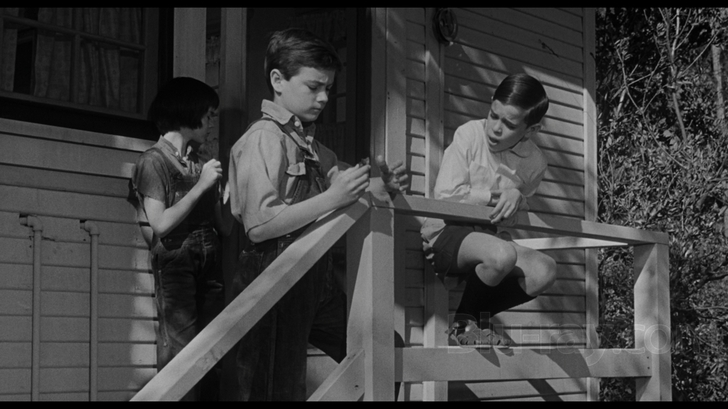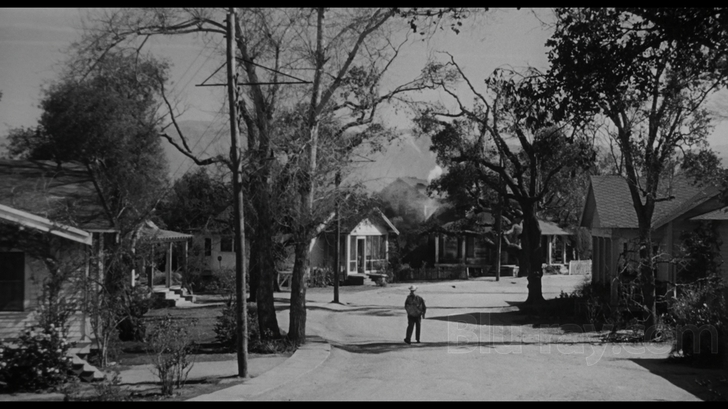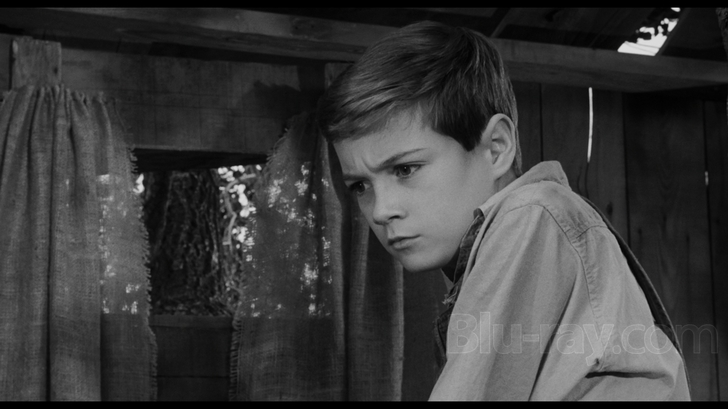To Kill a Mockingbird Blu-ray Movie
HomeTo Kill a Mockingbird Blu-ray Movie 
Universal 100th Anniversary | Collector's Series | Commemorative Limited Edition / Blu-ray + DVD + Digital CopyUniversal Studios | 1962 | 129 min | Not rated | Jan 31, 2012

Movie rating
8.5 | / 10 |
Blu-ray rating
| Users | 4.3 | |
| Reviewer | 5.0 | |
| Overall | 4.5 |
Overview
To Kill a Mockingbird (1962)
Atticus Finch, a lawyer in the Depression-era South, defends a black man against an undeserved rape charge, and his kids against prejudice.
Starring: Gregory Peck, John Megna, Frank Overton, Rosemary Murphy, Ruth WhiteNarrator: Kim Stanley
Director: Robert Mulligan
| Drama | Uncertain |
| Mystery | Uncertain |
| Crime | Uncertain |
Specifications
Video
Video codec: VC-1
Video resolution: 1080p
Aspect ratio: 1.85:1
Original aspect ratio: 1.85:1
Audio
English: DTS-HD Master Audio 5.1 (48kHz, 24-bit)
English: DTS 2.0 Mono
French: DTS 2.0 Mono
Subtitles
English SDH, French, Spanish
Discs
50GB Blu-ray Disc
Two-disc set (1 BD, 1 DVD)
Digital copy (as download)
DVD copy
BD-Live
Mobile features
Playback
Region free
Review
Rating summary
| Movie | 5.0 | |
| Video | 5.0 | |
| Audio | 4.0 | |
| Extras | 4.5 | |
| Overall | 5.0 |
To Kill a Mockingbird Blu-ray Movie Review
One of the glories of American cinema debuts on Blu-ray.
Reviewed by Jeffrey Kauffman January 20, 20121962 was a rather remarkable year for films featuring stellar performances by young actors. Patty Duke took home a well deserved Best Supporting Actress Academy Award for her iconic work in The Miracle Worker, but Patty’s was hardly the only notable performance that year. Duke was joined in the Best Supporting Actress category by another young girl whose performance has entered the annals of the near legendary, namely Mary Badham’s beautifully rendered work as Scout in To Kill a Mockingbird. There were a slew of other films that featured standout younger performances—Lolita, Sundays and Cybele, Cape Fear, The Music Man just to name a few—but no other film that year (and arguably any year) actually captured the viewpoint of children as magically yet realistically as To Kill a Mockingbird did. What’s perhaps so incredible about this beautifully heartfelt film is how effortlessly it manages to sum up an entire generation’s experience of one distinct region of the United States, namely the American South, dealing with all sorts of issues from the epochal (like race relations) to the seemingly picayune (like sibling rivalry and loyalty). The fact that To Kill a Mockingbird does this while virtually never deviating from its children’s perspective makes the film one of the most extraordinary achievements in the annals of film, one which intentionally maintains a simple, unaffected style that still manages to produce one of the heftiest emotional wallops imaginable. While a major subplot of the film casts a rather unseemly light on the American South, the incredibly noble and moral character of the focal children’s father, one Atticus Finch (Gregory Peck), an attorney who is hired to defend a black man accused of raping and beating a white girl, gives this film a strong ethical center which further helps to distinguish it and which adds inestimably to the film’s allure.

Harper Lee was a largely unknown quantity when her first (and only) novel To Kill a Mockingbird was published in July 1960. Lee had been encouraged by her childhood friend and neighbor Truman Capote (upon whom the character of Dill in the book is based), and Capote wrote a brief blurb on the dust jacket of the first edition hardback espousing Lee’s talent. (In an aside, that blurb led to the spurious rumor that Capote himself actually wrote the book, something which has been definitively disproven.) Lee had no great hopes for the book, and in fact the publisher had warned her it probably wouldn’t do very well, so she (not to mention the publishers) when the book became something of an overnight sensation. While there were definitely some naysayers (including author Carson McCullers, who considered To Kill a Mockingbird a bit too similar to her own Southern reminiscences), by and large critical reaction was overwhelmingly positive, and public reaction was nothing short of phenomenal. The property was quickly optioned for film, and by an unusual alignment of the stars (metaphorical and otherwise), a seemingly perfect combination of talents both in front of and behind the camera fell into place for what remains as one of the most sterling literary adaptations of all time.
Similarly, director Robert Mulligan wasn’t exactly a household name, either, though he had had the extreme good fortune to have partnered with producer Alan J. Pakula (who would also become a director of some considerable note) and did have a handful of features, as well as a long television career, under his belt. But Mulligan’s quiet, deliberate approach turned out to be absolutely perfect for To Kill a Mockingbird, especially with regard to coaxing absolutely realistic performances out the film’s central trio of children, Mary Badham as Scout Finch, the six year old from whose viewpoint (and memory) the film is told; Phillip Alford as Jem Finch, Scout’s older brother and erstwhile protector; and John Megna as colorful neighbor Dill, who joins the siblings in a series of adventures, many of which revolve around ferreting out information about the Finch’s mysterious neighbor, Boo Radley (Robert Duvall). As the kids’ exploits play out, the Finch’s father, attorney Atticus, finds himself caught up in simmering racial tensions when a local black man (Brock Peters) is falsely accused of having attacked a white girl (Collin Wilcox). Mulligan resolutely refuses to ever let the film lapse into melodrama, staging things simply and without sensationalism, and that approach gives the film much of its indelible emotional power.
The film, while unassuming and for the most part understated, is also devastatingly on target with all of its performances. The kids here are simply a revelation, natural and unforced, with perfectly nuanced turns and often exuberant moments of childlike wonder. The supporting cast is just flat out superb, from the really disturbing James Anderson as the piece’s villain Bob Ewell to the stoic and tragic Brock Peters as wrong accused Tom Robinson to Frank Overton as put upon Sheriff Tate to then newcomer Robert Duvall, who pretty much steals the final few moments of the film as neighbor Boo Radley. But it is of course Gregory Peck who anchors this film in its undeniably strong moral center. Has there ever been a more perfect marriage of actor and role than Peck as Atticus Finch? The Peck children in several supplements included on the Blu-ray state that Peck was much like Finch in real life, a lover of truth and justice and the American Way (not to be overly corny about it), and even Harper Lee was evidently moved to tears by Peck when she spent three weeks on set early in the film’s shooting schedule. As Cecilia Peck mentions a couple of times on supplements, an entire generation (maybe a couple of generations by this time) grew up wishing Peck’s Atticus Finch could have been their father, and it’s not hard to understand why, seeing the grace and grit of this character brought perfectly to life in one of the most iconic film performances of all time.
[In the trivial but fascinating department, To Kill a Mockingbird has one of the oddest concatenations of “famous relative syndrome” with regard to its cast and crew of any major motion picture. Just a brief listing includes these gems: Mary Badham (Scout) is the little sister of director John Badham (Saturday Night Fever); John Megna (Dill) is the half-brother of actress Connie Stevens; director Robert Mulligan was the brother of actor Richard Mulligan (Soap, Empty Nest); and Estelle Evans (housekeeper Calpurnia) was the sister of actress Esther Rolle (Maude, Good Times).]
To Kill a Mockingbird is a quiet film, and in fact several studios passed on optioning Lee’s novel because they couldn’t understand what possible allure it could have for audiences. “It’s about a lawyer and his two kids,” was all studio executives (never the most prescient bunch) could see in the book, obviously missing the profound truths buried in Scout and Jem’s world, like the treasures Boo Radley secrets away in the neighborhood tree cavity. But like a parent whispering to a beloved child, To Kill a Mockingbird speaks directly to the heart, never demanding attention, but commanding it nonetheless. If you’ve never seen this hugely affecting film, you’re in for one of the most touching experiences of your cinematic life. If you’re a longtime fan, rejoice that it’s been revitalized now to rediscover all over again.
To Kill a Mockingbird Blu-ray Movie, Video Quality 

Scuttlebutt has it the world may be ending in 2012, and there may be further signs of an impending apocalypse, at least for some ardent film fans, with the news that Universal, long the bane of catalog title collectors, seems to have finally woken up and realized how to treat its asset treasures. Now, I have never believed that at least some of Universal's catalog Blu- ray releases were as outright terrible as some claimed, but I seem to have a much higher tolerance for DNR than some. (On the other hand, edge enhancement and haloing drive me a bit crazy.) To Kill a Mockingbird is presented on Blu-ray with a VC-1 encoded 1080p transfer in 1.85:1 (and, yes, you read that right: VC-1). The film is part of Universal's well publicized 100th Anniversary promotional push to revisit many of its storied films, restoring and remastering them for home video release (not all of these legendary films will receive Blu-ray releases, unfortunately). This new Blu-ray has been sourced from high res scans of original 35mm source elements and the results are simply gorgeous. The clarity and precision of the image is breathtaking at times, with beautifully modulated gray scale, deep, rich blacks and piercing, though never blooming, whites. Though the film and all of the supplements are on a BD-50, perhaps because the supplements (save for the restoration featurette) are in SD, and there are absolutely no compression artifacts to report. The restoration featurette, which actually covers a lot of titles, actually spends a few seconds discussing one aspect of Universal's high def releases which seem to create the biggest controversy: digital noise reduction of grain. In the case of To Kill a Mockingbird, there were a number of optical push ins (as opposed to zooms) which magnified grain to a really ugly degree, something shown quite clearly in the restoration featurette. Rather than "erase" the grain, which the team of restorers quite clearly state is unthinkable, they used a new algorithm which "averaged" the grain over the entire sequence, including before and after the optical push. The results should please even the most persnickety videophiles. Several scenes which have been murky in previous home video releases, especially the final climactic Halloween segment, have whole new levels of shadow detail on this new Blu-ray. Well done, Universal—keep it up.
To Kill a Mockingbird Blu-ray Movie, Audio Quality 

To Kill a Mockingbird offers both a lossless DTS-HD Master Audio 5.1 surround mix as well as a standard DTS 2.0 mix. This would not seem to be a film especially suited to a surround track, and the good news is the track hasn't been overly "tarted up" to provide a false sense of immersion. The best part of the 5.1 track is the fuller representation of Elmer Bernstein's glorious score, one of the finest scores of the composer's long and legendary career. (I'm on record as having stated that Bronislau Kaper was robbed of an Oscar for his 1962 Mutiny on the Bounty, but Bernstein's To Kill a Mockingbird certainly gave him—and eventual winner Maurice Jarre for Lawrence of Arabia—stiff competition). Ambient sounds occasionally dot the surrounds (the rustle of leaves in that final horrifying Halloween sequence is a notable example), but the mixers have wisely kept things largely front and center, as they should be. Fidelity is excellent and the soundtrack bears no noticeable signs of age related damage. There is just very slight boxiness to some of the stems, including Kim Stanley's voice over narration, but it's not very distracting.
To Kill a Mockingbird Blu-ray Movie, Special Features and Extras 

All of the supplements from the Legacy Edition 2 DVD set have been ported over to this release, with the exception of the cardstock reproductions of the international lobby cards (some of which are reproduced in this Blu-ray's accompanying Digibook text):
- Fearful Symmetry (SD; 1:30:13). This feature length documentary is by Charles Kiselyak, and is a loving if unshrinking look back on the cultural milieu from which To Kill a Mockingbird sprang. There are copious interviews with several participants in the film, including Gregory Peck, the kids, as well as Mulligan and Pakula. The documentary also gets into some really interesting, if somewhat tangential, subjects like the importance of oral history in the American South.
- A Conversation with Gregory Peck (SD; 1:37:37) is another fantastic, feature length documentary which first finds the actor doing a personal appearance in Boston, answering questions from the audience. The film then follows Peck on a number of exploits with various family members, as he reminisces about his long and storied career. Some other audience participation interview segments are also included in this really beautifully done piece.
- Academy Award Best Actor Acceptance Speech (SD; 1:31) is a model for all the longwinded, self-important award accepters nowadays.
- American Film Institute Life Achievement Award (SD; 10:01) is a snippet from Peck's AFI tribute, including a wonderful speech by the actor.
- Excerpt from Tribute to Gregory Peck (SD; 10:09) is from a special Academy tribute to Peck, including Peck's four children.
- Scout Remembers (SD; 12:01) is a fun piece featuring Mary Badham remembering her experiences on the film.
- Feature Commentary with Director Robert Mulligan and Producer Alan Pakula is incredibly informative, though Pakula can be a little hard to hear at times. The two, who were partners for such a long time, have an easy rapport with each other, and Pakula coaxes a lot of anecdotes out of Mulligan. Highly enjoyable.
- Theatrical Trailer (SD; 2:52)
- 100 Years of Universal: Restoring the Classics (HD; 9:13) is a promo piece touting Universal's 100th anniversary and their restoration and preservation efforts. The new slate of restorations is covered briefly, including some looks at the restoration efforts. Universal releases are regularly pilloried for over aggressive DNR, and there's a very interesting segment on this featurette addressing that issue that all DNR-phobes really should watch. Other situations like flicker are also addressed. Audio restoration is also covered in this really interesting piece.
- U Control offers Cecilia and Anthony Peck narrating different PiP snippets which offer a number of participants like Robert Mulligan, Horton Foote, Mary Badham and Phillip Alford.
To Kill a Mockingbird Blu-ray Movie, Overall Score and Recommendation 

I'm not ashamed to admit I was once again a puddle of tears as To Kill a Mockingbird drew to a close as I watched it to prepare for this review. I've seen the film countless times, and it has the same effect on me, certainly a good indication of just how emotionally powerful the film is. How many films can you think of that lose little if any of their emotional resonance upon repeated viewings? To Kill a Mockingbird is one of that rare breed of films which seems timeless even as it precisely recreates a very specific time and place. Classic film lovers have come to dread Universal catalog releases (rightly or wrongly), but To Kill a Mockingbird sets a new standard for the studio, one which they hopefully will continue with as their hundredth anniversary celebration takes center stage. To Kill a Mockingbird instantly jumps to the front of the pack of best releases in the still young 2012, and it comes Highly recommended.
Other editions
To Kill a Mockingbird: Other Editions

To Kill a Mockingbird
Universal 100th Anniversary | 50th Anniversary Edition
1962

To Kill a Mockingbird
1960s Best Of The Decade Collection
1962

To Kill a Mockingbird
1962

To Kill a Mockingbird
1962

To Kill a Mockingbird
1962

To Kill a Mockingbird 4K
60th Anniversary Edition
1962

To Kill a Mockingbird
60th Anniversary Edition
1962

To Kill a Mockingbird 4K
60th Anniversary Limited Edition Giftset
1962
Similar titles
Similar titles you might also like

12 Angry Men
1957

A Time to Kill
1996

If Beale Street Could Talk
2018

In the Heat of the Night 4K
1967

Kramer vs. Kramer
1979

A Few Good Men 4K
25th Anniversary Edition
1992

Anatomy of a Murder
1959

Boxcar Bertha
1972

Hurry Sundown
1967

Red Riding: The Year of Our Lord 1983
2009

Sleepers
1996

Damages: The Complete Series
2007-2012

12 Angry Men
1997

The Story of Temple Drake
1933

King of the Hill
1993

Beyond a Reasonable Doubt
2009

Capote
2005

A Perfect World
1993

La Haine
1995

The Hate U Give
2018